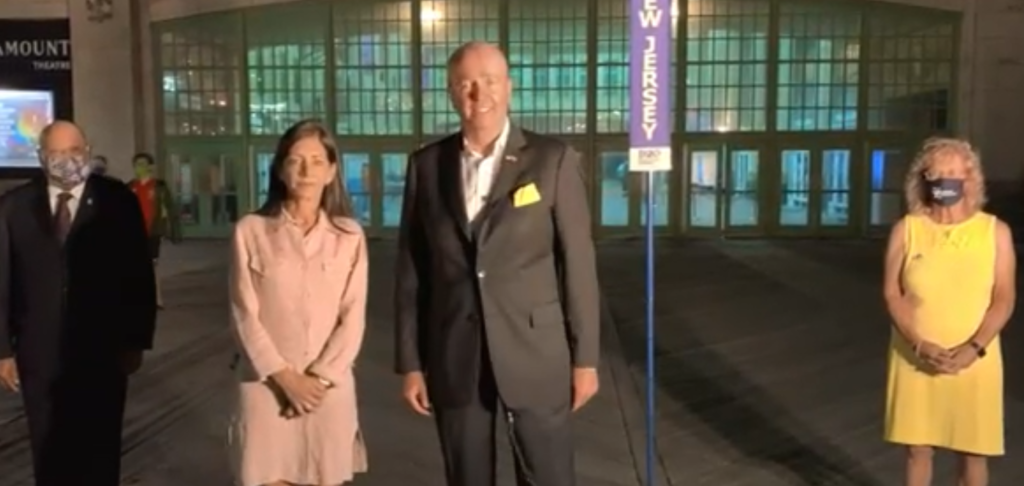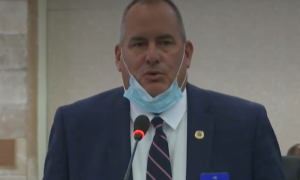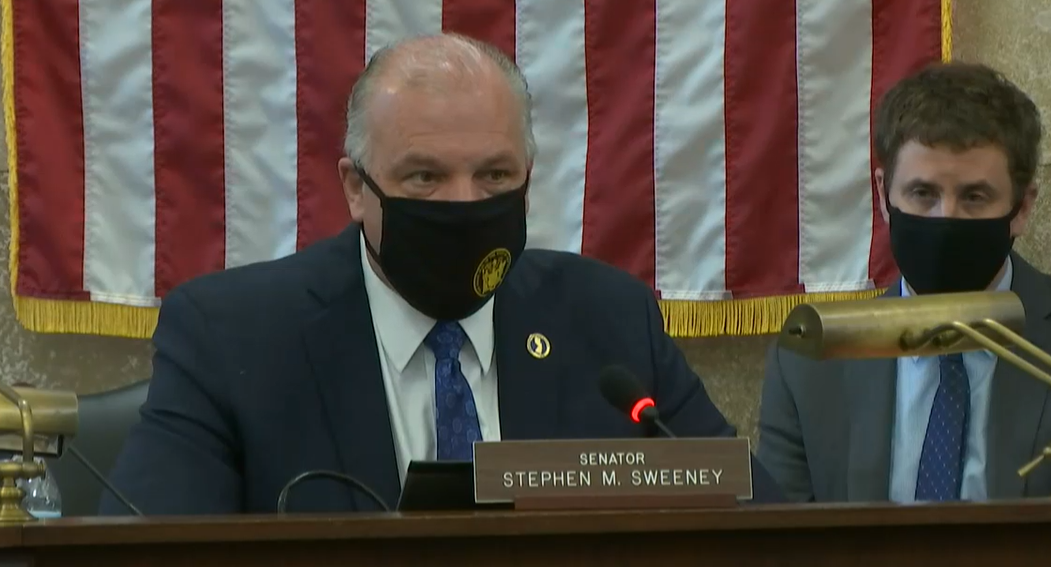A Muddied Murphy Path to the White House

Governor Phil Murphy can look upon a commonly misquoted phrase from his fellow Massachusetts man, Ralph Waldo Emerson: “Build a better mouse trap and the world will beat a path to your door.” In many ways, Governor Murphy will need to seriously scrutinize his political blueprints to build not so much a better mouse trap, but a better mix of fertilizer, if he wishes to clear a greener path and transcend the political maelstrom of Trenton for a stake in Washington DC.
In a previous article, discussing whether or not former Governor Chris Christie can be able to advance a further political career amid the implications of President Trump, Phil Murphy is another man worth watching if he has presidential aspirations of his own. And like his predecessor, he would face not inconsiderable challenges, from both a historical as well as a brand perspective.
Let us consider an uncomfortable reality. New Jersey has an image problem. To some extent, it is warranted, and in other respects, New Jersey is, to the broader American audience, something of a parody. From the legions of stereotypes which abound, a reputation for corruption and high taxation, New “Joisey” (and no New Jerseyan ever says “Joisey”) is thought of in terms of the Garden State Parkway, not the rolling pastures of Sussex, the quaint and rustic seaside of Ocean, nor the farmland of Monmouth, or the piedmont tranquility of Warren.
Instead, the image is of urban sprawl. Industrial plants. Landfills. Being New York’s red-haired step-child. This is a stereotype, of course, but “Jersey Shore” and even “The Sopranos” have not done New Jersey any favors as far as the lowest common denominator is concerned. Politically, New Jersey’s reputation is that of crushing taxes and sending retirees to Pennsylvania, Florida, or the Carolinas. Despite having the highest ranked educational system in the country, as Governor Murphy proudly pointed out only recently, New Jersey had—until the coronavirus pandemic locked up the entire country—been dealing with a serious “brain drain” of graduates looking for more affordable places to call home. Few Millennials, that generation now in their thirties and late twenties popping ibuprofen and antidepressants, own their own homes compared to their parents at that same stage in life. Gen Z, those who are in school now and in their early twenties, may fare little better economically. The youth of New Jersey is ethnically and religiously more diverse than ever, but also likely to be a generation of renters with fewer concrete ownership stakes in their communities, and less likely to be devoted to the old party affiliations than before. Senator Bernie Sanders, an independent-occasionally-Democrat who caucuses Democrat, and at 79-years-old enjoyed significant support from the youth of the Democrats: those who are not ashamed to call themselves “democratic socialists” or just “socialist.” Joe Biden, the 77-year-old candidate who would be the oldest elected president in history if he wins in November, inspires less enthusiasm in his own right except so far as he is not Donald Trump.
This cadre is a segment of voters that Phil Murphy must court, but cannot afford to take for granted in the slightest, if he wishes to make a presidential case in 2024 or later. With his announced deal this week for a Millionaires’ Tax and his support for legalized marijuana, Murphy’s progressive credentials are about as appealing to a voter base as any which does not regularly read the newest Bill O’Reilly “Killing [Insert Here]” book or regard the likes of Alexandria Ocasio-Cortez as a 21st Century version of Joseph Stalin.
But the youth vote is not enough. “Show me the money” – the money and the solid support for New Jersey Democrats has traditionally come from the unionized working-class and those whose jobs are closely interconnected with the apparatus of the state. That being said, these blue collar Democrats are not necessarily losing any sleep about whether or not a county official is called a “Freeholder” versus a “Commissioner,” but rather the serious, bottom-line issues of job security, affordability of healthcare, and the survivability of the imperiled New Jersey pension system.
When Senators Teresa Ruiz and Sandra Cunningham introduced S-685, which would allow

municipalities to mandate their police and firefighters to adhere to a five year residency requirement as a condition of hiring, the NJSPBA balked. Requiring police officers to live in town, they said, would hamper recruiting and meeting diversity requirements, and police recruiting was already down. They also made objections to being singled out. “Why not state employees,” said NJSPBA President Pat Colligan, “why not the rest of town employees?”
In a major break, Colligan met with Donald Trump on July 31 with NAPO representatives to endorse the president’s re-election bid. Executive VP Marc Kovar was cited as saying, “Too many elected officials have let us down despite the fact that New Jersey officers do their job professionally and with less and less need for force than officers in nearly every other state.” The PBA, it should be noted, also locked horns with the State Attorney General over AG Grewal’s package of police reforms, including the public publication of officers who have had certain disciplinary violations. Previously, the NJSPBA had endorsed the Obama/Biden ticket. But Biden carried no appeal in 2020, as the police cited what they perceived as an anti-police sentiment.
The Murphy administration, in light of the killing of George Floyd and others, have attempted to respond to the calls for police reform, while the thin blue line, traditionally supportive of Democrats, sees their jobs and professionalism as under attack. This major base could undermine Phil Murphy’s personal ambitions, should he seek the Oval Office himself one day, as having lost this bastion of support, but also potentially damage the New Jersey Democratic Party. How far that possible damage goes will largely depend on the state’s second-most-powerful official: Senate President Steve Sweeney.

Sweeney, whose roots are with the ironworkers and that unionized sector of labor, expressed his support for Ruiz’s police bill which passed out of committee. However, it is up to the Senate President to schedule it for a vote on the floor. The police may well come back, merely seeking to punish Murphy and, by extension, Grewal, if Sweeney does not advance the bill. If he does, and it passes, Sweeney and other Democrats may have to consider that the Republican Party will take full advantage of the opportunity, casting themselves—as Trump does—as the party of law and order. It is possible that this solid foundation of Democratic votes could be lost.
Long before the Murphy administration was witness to a clash with the police, the state’s top senate Democrat battled with the powerful teachers’ union, the NJEA. Sweeney fought for his political life in a tremendously expensive duel with the NJEA over Chapter 78 health plans for educators. When a deal was finally struck, with Sweeney’s considerable fingerprints all over it, NJEA President Marie Blistan stood with the senate president.
In the event that Phil Murphy finds he has outgrown New Jersey and wants to run for president, Sweeney will be the most logical Democrat successor. He has demonstrated that he is not afraid to duel, and duel hard, with unions, but also strike compromises to advance the business of government. How he handles the police situation with S-685 has yet to be seen.
The final matter for Murphy’s consideration is that of historical precedent. Only one New Jersey governor has gone on to become president, Woodrow Wilson—like Murphy, born out of state but finding an executive perch in Trenton. Wilson, however, was a single-term governor and was speedily propelled to take the Democratic nomination. New Jersey was the journey, not the destination. When Governor Christie attempted to run for president in the 2016 primary, he had already been a two-term New Jersey governor. He was unable to gain meaningful traction outside his home state. The Garden State had grown weeds around Christie’s ankles and kept him from leaving. Phil Murphy could find himself in a similar situation the longer he remains involved in New Jersey politics and cultivating a New Jersey brand which has limited appeal for Democratic voters compared to big states and big names like New York and Governor Andrew Cuomo.
The path ahead for Murphy is long and winding. But one thing is certain, as he manages the political and economic fallout from the coronavirus restrictions, he will need to decide whether to make New Jersey his destination, and dedicate his future campaigns to state leadership, or hack away the thorns which ensnared Christie’s legs and make a run as fast as his ubiquitously sneaker-shod feet will carry him.









Tammy is positioning Phil to be ready when Biden tanks in the debates and the Dems pull a Torricelli. Drumthwacket isn’t good enough for her to leave her Middletown mansion. She wants a 1600 Pennsylvania address.
I have to agree with you about Biden being replaced after the first debate. Even in no-pressure situations, he has a hard time forming a sentence and his facts are often wrong (200M dead from Covid). He loses his cool when challenged in unscripted campaign events. Remember Trump in 2016, how he beat up Rubio, Cruz and some of the others? Biden’s gonna short-circuit. It’s not gonna be pretty. I can’t imagine why his wife is allowing this to continue.
But Murphy? You don’t think the DNC will be stuck with Harris?